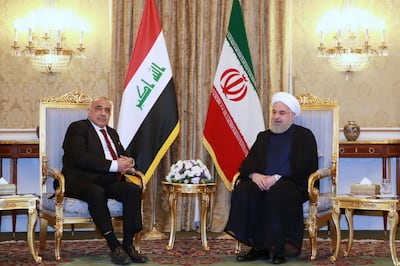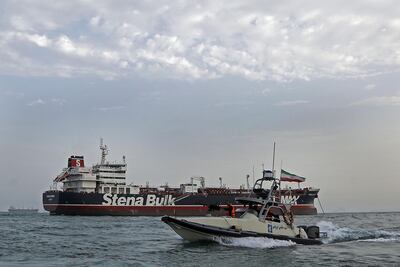Europe is to establish a maritime escort mission in the Arabian Gulf after Iran seized a British-flagged tanker, said the UK Foreign Secretary, Jeremy Hunt.
But Mr Hunt said the move was not part of the US maximum pressure policy on Iran and the European states would continue to seek a diplomatic solution to the Gulf crisis.
He said Iran’s “flagrant breach” of freedom of navigation made “appropriate action” necessary.
"The Iranians must understand there will be no compromise on freedom of navigation in the Strait of Hormuz,” Mr Hunt said.
He said the Stena Impero oil tanker was in Omani territorial waters heading west when it was redirected by Iranian forces.
Iraq's Prime Minister Adel Abdul Mahdi arrived in Iran on Monday to try to defuse tension.
Tehran says the seizure was a reciprocal measure after British forces stopped an Iranian oil tanker in Gibraltar. It was heading for Syria in a breach of international sanctions.
Britain and the White House held contrasting views over the incident in the Strait of Hormuz, with US Secretary of State Mike Pompeo saying it was up to London to deal with the situation.
Mr Pompeo's comments are at odds with a British government spokesman who said it would continue to “work closely” with international partners to ensure freedom of navigation.
“This is the kind of behaviour we’ve seen out of Iran for 40 years,” Mr Pompeo told Fox News.
"The United States has a responsibility to do our part but the world's got a big role in this too, to keep these sea lanes open."
He said Iran's takeover of the Stena Impero in international waters amounted to "national piracy".
“The high volume of ships moving through the Strait of Hormuz – up to 30 ships covering more than 100 nautical miles – makes it impossible to escort vessels individually,” a spokesman for UK Prime Minister Theresa May said.
“We already work closely with international partners to ensure a co-ordinated effort to defend freedom of navigation.
"This includes sharing information on threats to shipping and offering mutual protection for each other’s vessels.”
A British Defence Minister, Tobias Ellwood, said his country’s navy was not large enough to protect its assets around the globe.
The only British Navy ship in the region, the HMS Montrose, arrived too late to intervene in the takeover of the Stena Impero.
The owners of the vessel said on Monday that they had made a formal request for permission to visit the 23 crew members, who were being held in Iran.
“If we want to continue playing a role on the international stage – bearing in mind that threats are changing, all happening just beneath the threshold of all-out war – then we must invest more in our defence including our Royal Navy,” Mr Ellwood, a former soldier, told Sky News.
"Our Royal Navy is too small to manage our interests across the globe, if that's our future intentions, and that's something the next prime minister will need to recognise."
Lord West, a former admiral, said the Royal Navy was "disgracefully short of ships".
And the former commander of Britain's maritime forces, Rear Admiral Alex Burton, told the BBC: "There is no doubt that the size of the navy since 2005, reduced from 31 frigates and destroyers to now 19, has had an impact on our ability to protect our interests round the globe."
But Mr Ellwood rejected claims that Britain had taken its “eye off the ball".
“It is impossible simply to escort each individual vessel,” he said.
“Let’s place it into context. This has been a sudden spike in activity, in threat, that’s ratcheted up in the past few weeks. And it takes time to respond there.”
He confirmed reports that Britain was considering sanctions.
The UK could also push the EU and UN to renew sanctions that were lifted in 2016, when Iran agreed to a deal to limit to its nuclear strength.
The government renewed its call for Iran to release the ship and said it "was seized under false and illegal pretences".
"We do not seek confrontation with Iran but it is unacceptable and highly escalatory to seize a ship going about legitimate business through internationally recognised shipping lanes," a spokesman for Mrs May said.
She will chair an emergency Cabinet meeting on Monday and Mr Hunt is expected to update Parliament on the government's approach.
He spoke on Sunday to French and German foreign ministers, who condemned Tehran’s actions, the British Foreign Office said.
“Both ministers agreed with the foreign secretary that safe passage for vessels through the Strait of Hormuz is a top priority for European nations, while avoiding any possible escalation in the region,” it said.
German Foreign Minister Heiko Maas said: "What we need is de-escalation, and my British and French colleagues have the same opinion."
Reaction in the Arabian Gulf was critical of the Iranian seizure.
OmanI Foreign Minister Yousef bin Alawi is due in Tehran on Saturday to discuss “recent regional developments" after urging Iran to release the ship and exercise restraint.
Saudi Minister of State for Foreign Affairs, Adel Al Jubeir, described it as an “attack on the freedom of navigation” and “a violation of international law".
“Iran must realise that its acts of intercepting ships, including most recently the British ship, are completely unacceptable,” he wrote on Twitter.
Kuwait’s Foreign Ministry, while not directly mentioning Iran, said the seizure “would increase escalation and tensions and put navigation safety under direct threat".



